This fall the ASU Library welcomes seven students to the Community Archivist Fellowship Program, which seeks to inspire community and tribal college students to become professionally trained archivists or librarians.
“This program is extremely crucial because Black, Indigenous, and People of Color (BIPOC) only represent 16% of the archival profession. By centering their lived experiences, knowledge, and community memory, we seek to create a safe space that supports student success and improves the educational pathway.” said Nancy Godoy, director of the Community-Driven Archives (CDA) Initiative.
During the academic year, students will be introduced to community-driven archives and work closely with archivists and staff from the CDA Initiative and the Labriola National American Indian Data Center. This grant-funded project is made possible in part by the Institute of Museum and Library Services (IMLS).
“We’re excited to welcome these inspiring ‘memory keepers’ to the library for this program,” said Ah’sha Notah, the program coordinator for the IMLS grant, titled Centering BIPOC Memory Keepers and Advancing Equity and Inclusion. “It’s going to be a fun journey and experience for our fellows to be exposed to a new field such as Library and Information Science. Both mentors and mentees will be learning from each other as we focus on learning about the fundamentals of archiving and tailor the practice of archiving to fit the needs of our fellows’ local communities.”
The ASU Library asked each of the students to share a little about themselves. In their own words, read about what memory keeping means to them, and what they are looking forward to during this experience.
Marcilla Cruz attends Tohono O'odham Community College and is majoring in business administration.
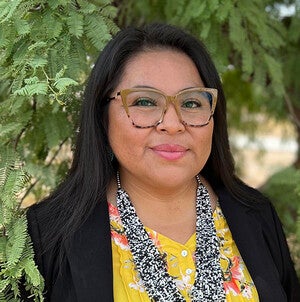
Marcilla Cruz is an enrolled member of the White Mountain Apache Tribe. She is Iyaa’aiye (Eagle Clan) born for Bizaha (Roadrunner Clan). She is a Navy veteran who has received an associate degree in Social work and a certificate in Substance Abuse and Addiction Studies from Tohono O’odham Community College where she is continuing her studies in Business. Marcilla has always had a love of learning and is looking forward to starting this journey with the Community-Driven Archives Initiative. She hopes that she will gain new knowledge to help with cultural and linguistic preservation for her community.
Memory keeping holds significant meaning to me as an Apache woman because it is deeply rooted in cultural traditions and practices. It serves as a way to preserve and honor the history, ancestral knowledge, cultural heritage and language of my people. It is a way to maintain a strong connection to my people and ensure that our cultural traditions continue to thrive in the present and future generations. During this fellowship opportunity, I can gain a deeper understanding of cultural memory keeping practices from various perspectives and cultures. By researching and analyzing different traditions, ceremonies, and methods of memory keeping, I can expand my knowledge base and provide more comprehensive and accurate information. By gaining insights and knowledge about cultural memory keeping, I can enhance my ability to provide culturally sensitive and inclusive responses, ensuring that I remain a valuable resource for my Tribe.
Esme Mcharg attends Paradise Valley Community College and is majoring in animation.
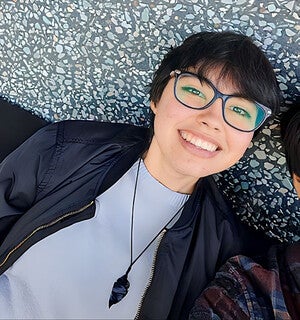
Hello, my name is Esme McHarg, I'm Mexican-American, and my pronouns are she/her. I am very passionate about art, creativity and learning. I like to read and play with my kitten Spicy in my free time. I am very excited to join the CDA Fellowship program and learn about being an archivist."
For me, memory keeping is a way to keep someone's culture, family, and heritage alive by passing on information and or stories relating to them. I believe that it is very important to preserve one's stories and have the ability to pass them on so others are able to better understand a certain culture. All cultures are beautiful and hold so much heart and importance because that's how people live, those are the hopes and dreams of people back then and now, that collectively come together to share with one another to be more connected and loved and feel like they belong. Times change and beliefs change, but nonetheless, those people's ideas and beliefs should still continue to be preserved so we can learn from them, and be empathetic and understanding towards one another.
During this fellowship opportunity, I hope to gain better insight into who I am and what I want to do with my life. I know I love art and stories and I want to find a place, a job where I can express myself and visually represent stories with my art, continue learning about stories from different cultures, and hopefully better connect myself with my own culture. Not only will this fellowship introduce me to a whole new area of study I previously didn't consider I would want to do, but It will also give me the opportunity to continue my studies by funding my schooling. I am very grateful for this opportunity and I can't wait to start.
Myacedes Miller attends Mesa Community College and is majoring in business.
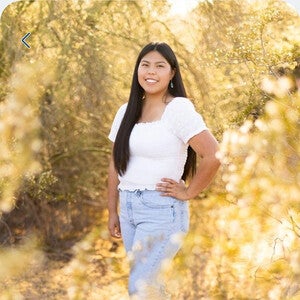
Yá'át'ééh my name is Myacedes Miller my clans are Red House born for the Bitter Water people, my maternal grandfather is Salt clan and my paternal grandfather is Mexican clan. I am Navajo from Lechee, Arizona and I am 19 years old. Currently, I attend Mesa Community College where I major in business and aspire to transfer to ASU. My leadership experience includes being an Executive Officer as the Student Senate Representative for the Inter-Tribal Student Organization (ISO). This organization is a student club at MCC that focuses on Indigenous student engagement and activities. I am also proudly employed at Mesa Community College's American Indian Institute, where I am able to help my fellow peers in navigating college resources and lend my leadership skills to inspire college success. My professional goals are to have my own non-profit organization that will benefit indigenous youth and communities. A few fun facts about myself, my hobbies include playing the violin and ukulele. I also enjoy reading, my favorite book is currently Fire Keeper's Daughter by Angeline Boullie. I also enjoy planning and volunteering at community events and doing karaoke with friends.
Memory keeping to me means preserving life experiences and personal objects. I believe memory keeping also preserves emotions, it can bring us inspiration and strength during hard times. Personally, I feel it helps us connect with one another and helps us feel closer to each other even if loved ones are apart. Memory keeping connects us with our ancestors' heritage and culture. I hope to gain a better understanding and learn from hands-on experiences of the processes in archiving. And I hope to connect, gain insight from experts in the field such as the mentors and students.
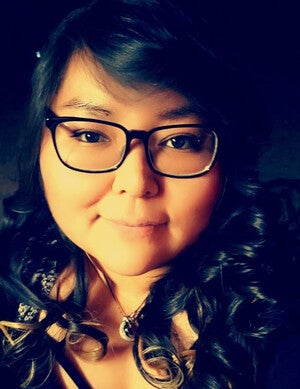
Janine Nelson attends Mesa Community College and is majoring in arts with an emphasis in Information Studies and eSociety.
Yá'át'ééh, shí éí Janine Nelson yinishyé. Kinłíchii'nii nishłį. Tł'ízí łání báshishchíín. Tódich'íi’nii dashicheii. Táchii'nii dashinálí. Ákot'éego Diné asdzáán nishłí. Hello, my name is Janine Nelson and I'm originally from an area on the Navajo nation called Shonto. Currently I'm living in Casa Grande with my big family. In my free time, I like to spend time with the people who matter most to me, travel to new places with my family, read, watch movies, cook or play the piano whenever I get the chance. My biggest comforts are listening to or playing music and reading various books that many creative people today have made possible. I especially enjoy listening to my parents recount stories, memories, and teachings from their childhood. I've grown up being taught to work hard, make the most of my education, and help my community in return. I look forward to gaining all that I learn and turning it into a passion which could carry on the traditions of my people to the next generation. Ahéhee’, Thank you.
To me, memory keeping means to document or record memories, stories, teachings, or pictures for you and future generations to see. In that way, what had been won’t be lost to what will be. It is precious and can be enjoyed by many people that can also share in that history. This fellowship opportunity will provide many more options to explore careers that I had only briefly considered. Without this program, I had not thought to fully pursue a passion that involved a community’s history as an archivist or maintain various materials in a database as a librarian. Either option provides skills and experiences that I hope to use later in the career I choose.
Darlene Peralta attends Pima Community College and studies Liberal Arts.
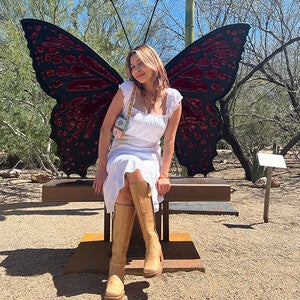
Darlene Peralta moved to Tucson, Arizona from Sonora, Mexico at age 7. As an Undocumented student, she struggled to find opportunities after graduating high school. However, Darlene became a student support fellow for ScholarshipsAZ, creating and leading presentations for other underrepresented students. She is currently pursuing an associate's degree in Liberal Arts at Pima Community College and serves as President of the Undocumented Youth Alliance Club. Darlene hopes to transfer to a university for a History BA and eventually a Master's in Textile Conservation. Where she hopes to continue her passion for preserving the past and promoting educational equity.
What Memory keeping means to me is keeping the past present and honoring the recipes and stories of the women that came before me. It is preserving our ancestral culture and history from documenting oral stories, pictures, videos, and physical objects. Memory keeping is passing down the stories and recipes my grandmother told my mother, and keeping them alive for future generations. What I am hoping to gain during this fellowship is to be able to feel confident enough to pursue a masters degree in textile conservation, to create a community of folks that are passionate about preserving the past and promoting educational equity.
Shelly Talas attends Mesa Community College and is majoring in American Indian Studies.
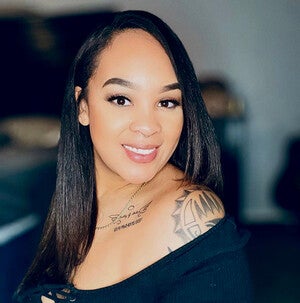
Shelly Talas is a member of the Bear Clan of the Hopi Tribe and is from the village of Mishongnovi located in Second Mesa, Arizona. She is also half-Black American, her father is from Pittsburgh, Pennsylvania. She is 33 years old, has four children, and in 2018 continued her post-high school education. She has recently obtained her associate's degree in American Indian Studies at Mesa Community College and is currently continuing at MCC to obtain her associate's degree in Information Studies and eSociety. In the fall of 2024, she plans on transferring to NAU to obtain her Bachelor's Degree in Anthropology.
Talas is passionate about historical cultural restoration and through the years, volunteered in various outreach programs to support the Hopi tribe and other tribes seeking repatriation and/or methods to preserve their cultures. She is an active member of the Association on American Indian Affairs who strive to protect sovereignty, preserve culture, and educate youth. Shelly is also an Area-leader for the Culture pillar in her employer's Employee Resource Group, Indigenous Circles. In this group, the culture committee onboards new hires and develops retention strategies for Indigenous employees. She also advocates for cultural representation within her organization.
Aside from volunteerism, Shelly is also the co-founder of a small non-profit organization called Standing Rain. In its current efforts to help urban Native youth in Mesa, AZ by collecting school supplies, clothing, and shoes, she wishes for the organization to move onto her reservation where she feels that the fulfillment of its mission will be completed there in her homeland.
To me, memory keeping means being able to carry on my culture and traditions through my parents, grandparents, and many before them. We memory keep by sharing histories, documents, photos, experiences, and stories from the past. I am interested in the ways that this fellowship opportunity can help me grow both professionally and personally. I also hope to be able to learn new leadership skills and to also further develop my interpersonal knowledge.
Mateo TreeTop attends Scottsdale Community College and is majoring in Theater and Visual Communication.
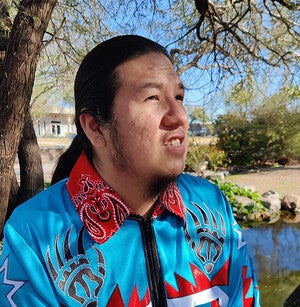
Mateo TreeTop is Hunkpapa Lakota and a citizen of the Standing Rock Sioux Tribe from Ft. Yates, North Dakota who has lived in Mesa, Arizona for 21 years. Mateo honors his Lakota and Hidatsa ancestors as a Grass Dancer and his cultural teachings and practices have been the foundation of his accomplishments, which include graduating from Westwood High School in 2015 on the Principal’s Honor Roll with 10 years of Perfect Attendance, Standing Rock Scholars Award (2020), and Scottsdale Community College Visions & Voices Poetry Contest-First Place (Spring 2020 and Spring 2022). Mateo navigates daily life with a Traumatic Brain Injury and is dedicated to assisting and supporting other Native youth who are transitioning into adulthood with a disability. He is employed by Diverse Ability Incorporated and serves as the Key Native Peer Navigator for multiple week-long sessions of the Arizona Youth Leadership Forum each summer. Mateo graduated from Scottsdale Community College in 2022 with an Associate of Applied Science-Visual Communication and an Associate in Fine Arts-Theatre. He is also employed by the University of Arizona-Sonoran Center for Excellence in Disabilities as a Graphic Designer. Mateo was awarded the Marcus Harrison Jr.-Leadership Award in 2017 and the Diverse Ability Incorporated-Cross-Cultural Advocacy Award in 2022 for his disability leadership and advocacy work. He also currently serves as a member of the Board of Directors for the Arizona Developmental Disabilities Planning Council. Mateo is a creative poet, actor, video gamer and peaceful warrior who is thankful for the opportunity to tell the inspiring stories of our Indigenous ancestors and disability rights leaders as a member of the Community Archivist program at ASU.
What memory keeping me is being able to share and past experiences and events from one generation to the other while keeping most of your information and initial feelings intact. I hope the game of business knowledge of how to work in either archives at the librarian to help bring a different aspect and knowledge to their collections.